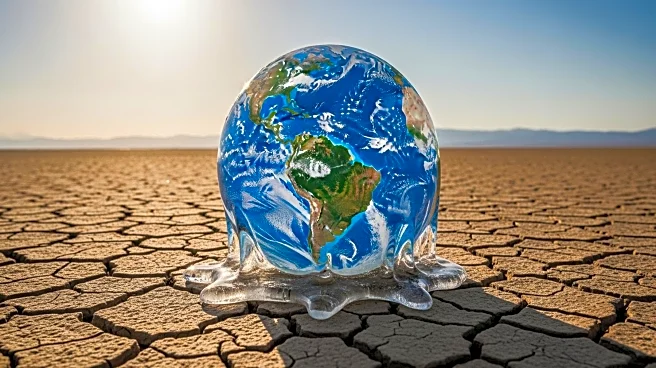What's Happening?
Recent data from the World Meteorological Organization confirms that 2024 was the hottest year on record, with Earth's surface temperature exceeding preindustrial averages by more than 1.5 degrees Celsius. This trend is part of a broader pattern of increasing global temperatures, with heat waves becoming hotter, more frequent, and longer-lasting. The University of Maine Climate Change Institute and the National Centers for Environmental Prediction have provided forecasts showing unusually high temperatures across Europe. While attributing individual heat waves to climate change requires detailed analysis, the overall increase in temperature extremes is consistent with scientific predictions about the impacts of global warming.
Why It's Important?
The record-breaking heat across Europe is a stark reminder of the urgent need to address climate change. Rising temperatures can lead to severe consequences, including health risks, agricultural challenges, and increased energy demand. Heat waves can exacerbate existing vulnerabilities in infrastructure and public health systems, particularly in regions unaccustomed to extreme temperatures. The data underscores the importance of international cooperation and policy measures to reduce greenhouse gas emissions and mitigate climate change impacts. It also highlights the need for adaptation strategies to protect communities and ecosystems from the adverse effects of rising temperatures.
What's Next?
As global temperatures continue to rise, governments and organizations must prioritize climate action and resilience-building efforts. This includes investing in renewable energy, enhancing energy efficiency, and developing infrastructure to withstand extreme weather events. Public awareness campaigns and education initiatives can help communities understand the risks associated with heat waves and promote adaptive behaviors. International climate negotiations will play a crucial role in shaping future policies and commitments to limit global warming and protect vulnerable populations.
Beyond the Headlines
The increasing frequency and intensity of heat waves raise ethical questions about the responsibility of industrialized nations in contributing to climate change and the disproportionate impact on developing countries. It also highlights the need for equitable solutions that address the social and economic dimensions of climate change. Long-term shifts in climate patterns could lead to changes in migration, economic stability, and social dynamics, necessitating comprehensive strategies to support affected populations.











